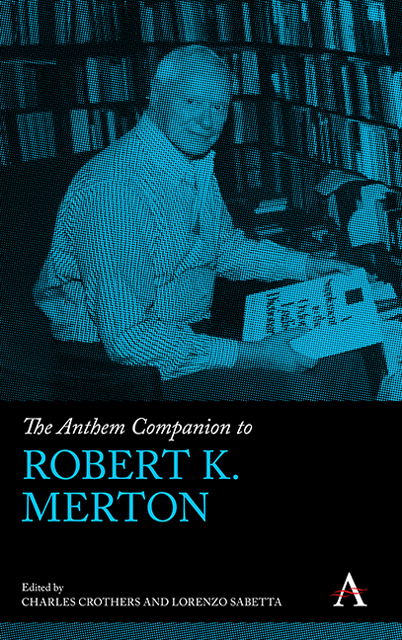Book contents
- Frontmatter
- Dedication
- Contents
- List of Figures and Tables
- Chapter One Introduction: Merton’s Self-Exemplifying Classical Sociological Contributions
- Chapter Two Skeptical Faith, Left Politics, and the Making of Young Robert K. Merton
- Chapter Three Theorist’s Progress: Young Robert K. Merton, 1941–1949
- Chapter Four Taking a Seminar with Merton
- Chapter Five The Development of Mertonian Status-and-Role Theory
- Chapter Six Theory as an Option or Theory as a Must? The Bearing of Methodological Choices on the Role of Sociological Theory
- Chapter Seven “Interviews of a Special Type”: Robert K. Merton and Codification of the Focused Interview
- Chapter Eight Science as a Culture
- Chapter Nine “Providing Puzzles”: Science as Norms and Values
- Chapter Ten A Mertonian Breviary for Cultural Sociologists
- Chapter Eleven The Unpublished Robert K Merton
- Author Biographies
- Index
Chapter One - Introduction: Merton’s Self-Exemplifying Classical Sociological Contributions
Published online by Cambridge University Press: 10 January 2023
- Frontmatter
- Dedication
- Contents
- List of Figures and Tables
- Chapter One Introduction: Merton’s Self-Exemplifying Classical Sociological Contributions
- Chapter Two Skeptical Faith, Left Politics, and the Making of Young Robert K. Merton
- Chapter Three Theorist’s Progress: Young Robert K. Merton, 1941–1949
- Chapter Four Taking a Seminar with Merton
- Chapter Five The Development of Mertonian Status-and-Role Theory
- Chapter Six Theory as an Option or Theory as a Must? The Bearing of Methodological Choices on the Role of Sociological Theory
- Chapter Seven “Interviews of a Special Type”: Robert K. Merton and Codification of the Focused Interview
- Chapter Eight Science as a Culture
- Chapter Nine “Providing Puzzles”: Science as Norms and Values
- Chapter Ten A Mertonian Breviary for Cultural Sociologists
- Chapter Eleven The Unpublished Robert K Merton
- Author Biographies
- Index
Summary
This chapter is an introduction to Robert K. Merton's life, work and position in the sociological landscape, and to this Anthem Companion, which explores aspects of these topics in detail. Here, we provide an overall framework within which the various specialist essays can be located.
Over his 70-year career, Merton worked across a wide array of substantive areas including, in chronological order, historical sociology of science, anomie theory and the sociology of deviance, ethnic studies, the sociology of knowledge, the sociology and social predictions (self-fulfilling and suicidal prophecies), housing/community studies, mass media/communication studies, bureaucracy and organizations, the professions and, toward the end of his career, an emerging programme in what he referred to as ‘sociological semantics’. Much this substantive work exhibits a marked discontinuity which is the typical pattern in the growth and development of knowledge – often a substantive concern was put aside, only to be picked up, reworked and extended later in his career.
What did remain constant were his theoretical concerns and modus operandi – while they evolved over time – that centered on analysis of diverse types of social structures, and especially how social structures both enable and constrain – provide incentives for and sanctions against – the social actions that people choose to undertake in their everyday lives. In addition, Merton then examines the consequences – both intended and unintended – of these actions for individuals, groups, organizations, and for society itself.
Throughout his career, Merton coined a slew of sociological concepts and terms, presented in the more than 20 books and 200 scholarly articles that he either authored, co-authored or edited, including ‘unanticipated consequences of social action’, ‘manifest and latent functions’, ‘the self-fulfilling prophecy’, ‘focus groups’, ‘role models’, and ‘the Matthew Effect’, to name but a few. Merton also served in various roles on various learned societies, funding agencies, advisory boards, and federal commissions and advocated for establishing the professional and cognitive identity of the fledgling discipline of sociology.
These contributions varied in quality and consequence and generated a secondary literature comprising a large volume of citations. He is one of the most cited scholars of the twentieth century. His classic Social Theory and Social Structure (STSS) has been cited more than 5,000 times not to mention the uncited influence of his work which has become so well known that it is known in Merton's own phrase as ‘obliterated by incorporation’.
- Type
- Chapter
- Information
- The Anthem Companion to Robert K. Merton , pp. 1 - 34Publisher: Anthem PressPrint publication year: 2022

